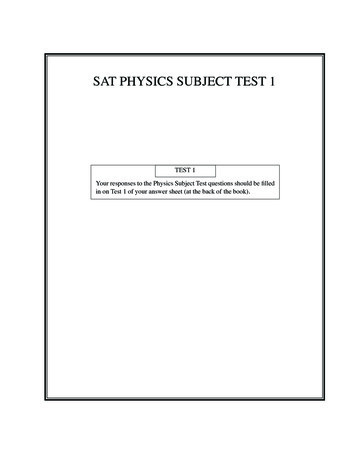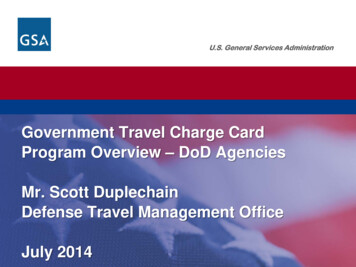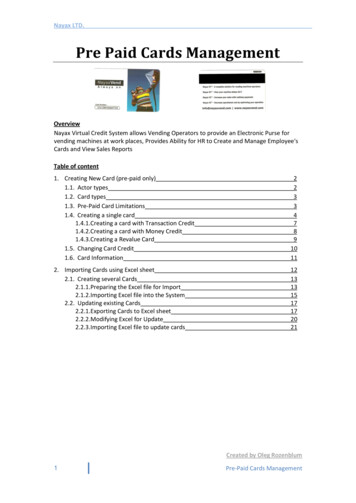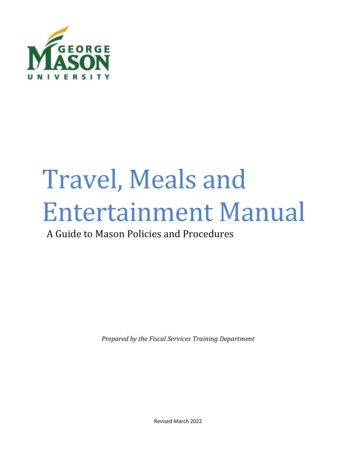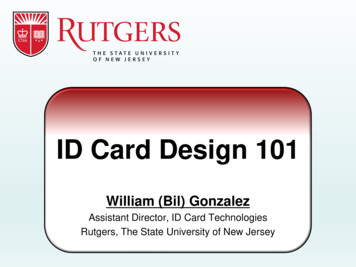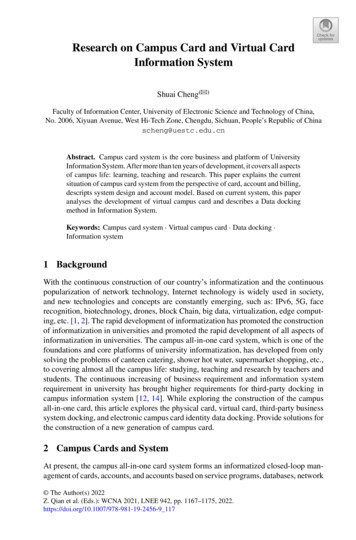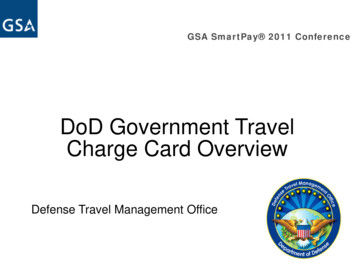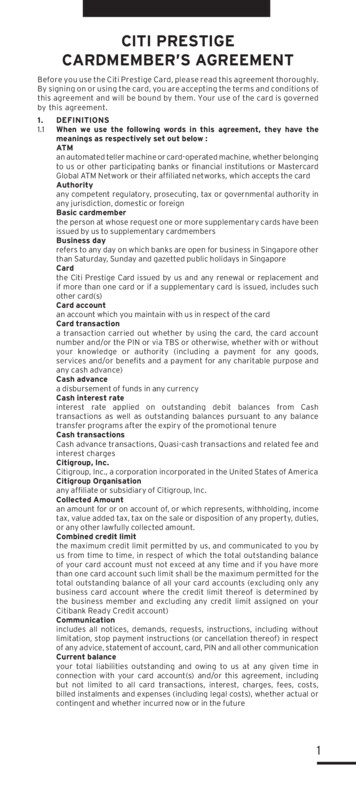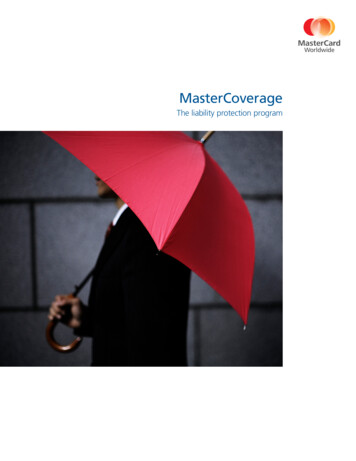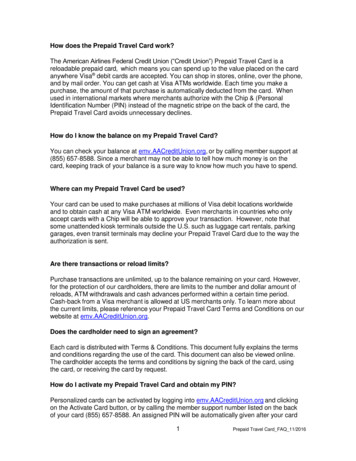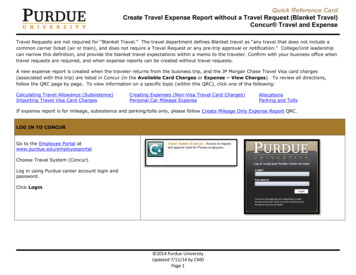
Transcription
DCMA Manual 4301-08, Volume 2Travel: Government Travel Charge Card Office of PrimaryResponsibility:Stewardship CapabilityEffective:September 23, 2019Releasability:Cleared for public releaseNew IssuanceImplements:DCMA-INST 4301, “Stewardship,” July 18, 2018Incorporates and Cancels: DCMA-INST 536, “Government Travel Charge Card,"October 1, 2009Internal Control:Process flow and key controls are located on the Resource PageLabor Codes:Located on the Resource PageResource Page s/4301-08v2r.aspxApproved by:David H. Lewis, VADM, USN, DirectorPurpose: In accordance with DoD Directive 5105.64, “Defense Contract Management Agency(DCMA),” this manual implements policy established in DCMA Instruction 4301,“Stewardship,” for administering the travel program for the Agency. This volume implementsDoD Instruction 5154.31, Volume 4, “Government Travel Charge Card (GTCC) Regulations,assigns detailed responsibilities, and prescribes procedures for managing commercial travel andimplementing the DoD Government Travel Charge Card Program.
DCMA-MAN 4301-08, Volume 2, September 23, 2019TABLE OF CONTENTSSECTION 1: GENERAL ISSUANCE INFORMATION .41.1. Applicability.41.2. Policy .4SECTION 2: RESPONSIBILITIES .52.1. Director, DCMA.52.2. Executive Director, Financial and Business Operations/Comptroller .52.3. Component Program Manager .52.4. Operational Unit Commander/Director .52.5. Agency Program Coordinator .62.6. Commanders/Directors, Contract Management Offices .62.7. DCMA Supervisors and Managers.72.8. Cardholder .7SECTION 3: PROCEDURES .93.1. Card Limits.93.2. Agency Program Coordinator Requirements and Functions .93.3. Agency Program Coordinator Training .113.4. Agency Program Coordinator Bank Vendor Access .113.5. Government Travel Charge Card Categories .123.6. Applications .133.7. Advance Conference/Registration Fees.143.8. Foreign Currency Conversion .143.9. Permanent Change of Station Program .143.10. Centrally Billed Accounts .163.11. Mission Critical Status .173.12. Government Travel Charge Card Payment.173.13. Review of Government Travel Charge Card Accounts .183.14. Security Clearance.193.15. Discipline for Misuse or Delinquency .19SECTION 4: MANAGERS’ INTERNAL CONTROL PROGRAM .214.1. Government Travel Charge Card Misuse or Abuse .214.2. Agency Program Coordinator Designation Letters .214.3. Delinquency/Misuse Notification.214.4. Metric Reporting .214.5. Program Update.214.6. Automated Teller Machine Cash Advance Use.224.7. Willful Misuse or Abuse .224.8. Eligibility.224.9. Cardholder Documentation .234.10. Local Travel .234.11. Periodic Government Travel Charge Card Review .23GLOSSARY.24G.1. Definitions .24Table of Contents2
DCMA-MAN 4301-08, Volume 2, September 23, 2019G.2. Acronyms .27REFERENCES .28Table of Contents3
DCMA-MAN 4301-08, Volume 2, September 23, 2019SECTION 1: GENERAL ISSUANCE INFORMATION1.1. APPLICABILITY. This issuance applies to all Agency organizations unless higher-levelregulations, policy, guidance, or agreements take precedence.1.2. POLICY. It is DCMA policy that:a. The Government Travel Charge Card (GTCC), also known as an Individual BilledAccount (IBA) or travel card, will be used by all eligible DCMA travelers to pay for all costsrelated to official government travel, including travel advances, lodging, transportation, rentalcars, meals and other reimbursable expenses, unless otherwise specified.b. This manual is executed in a safe, efficient, effective and ethical manner.Section 1: General Issuance Information4
DCMA-MAN 4301-08, Volume 2, September 23, 2019SECTION 2: RESPONSIBILITIES2.1. DIRECTOR, DCMA. The Director, DCMA, will ensure a GTCC program is establishedand resourced to meet the requirements of DoD Instruction (DoDI) 5154.31, Volume 4, "DoDGovernment Travel Charge Card Regulations."2.2. EXECUTIVE DIRECTOR, FINANCIAL AND BUSINESS OPERATIONS ANDCOMPTROLLER. The Executive Director, Financial Business Operations and Comptrollerwill:a. Exercise overall responsibility for the Agency’s GTCC Program.b. Appoint the Component Program Manager (CPM) and Agency Program Coordinators(APCs) Hierarchy Level 3 (HL3) for DCMA Headquarters in writing. The CPM/APCdesignation letter template is located on the Resource Page.2.3. COMPONENT PROGRAM MANAGER. The CPM will:a. Establish and manage the Agency’s GTCC Program in accordance with the DoDI5154.31, Volume 1, “Commercial Travel Management.”b. Establish and maintain the component’s organizational structure (“hierarchy level”) andnotify the Defense Travel Management Office (DTMO) and the card vendor of any changes inorganizational structure that affect the travel card program. The DoD/DCMAoverarching/current hierarchy structure is located on the Resource Page.c. Conduct annual hierarchy level (HL) reviews to include validating HL structure andverifying points of contact (POC) information. This process may be delegated down to lowerHLs.d. Ensure that the GTCCs and Centrally Billed Accounts (CBAs) are properly approved,credit limits are established and maintained, and annual reviews are performed to monitor creditlimits and card utilization.2.4. OPERATIONAL UNIT COMMANDER/DIRECTOR. The Operational UnitCommander/Director will:a. Ensure all personnel are properly trained on travel card use and policy pursuant to DoDI5154.31, Volume 4.b. Ensure that all personnel understand their roles and responsibilities related to usage of theGTCC.c. Appoint in writing APCs HL4 for region and executive directorate commands (i.e., East,Central, West, International, Cost & Pricing, Special Programs, Information Technology (IT) andHeadquarters (HQ)) and appoint APCs HL5 for each Contract Management Office (CMO) inSection 2: Responsibilities5
DCMA-MAN 4301-08, Volume 2, September 23, 2019writing and provide a copy of each appointment letter and training requirements to the GTCCCPM. The Defense Travel System team provides APC support for HQ cardholders.d. The individual appointed must possess the knowledge, skills and abilities required to carryout the responsibilities effectively.e. The APC must have access to, and the ability to relay sensitive information to the chain ofcommand for determination of appropriate action.f. Commanders/supervisors must give the APC the necessary amount of time required tocarry out APC responsibilities.2.5. AGENCY PROGRAM COORDINATOR. The APC will maintain a copy of thememorandum of appointment until superseded. Training on the roles and responsibilities of theAPC is required prior to appointment, including proper management, control and oversight toolsand techniques. APCs will:a. Perform the day-to-day administrative functions of the GTCC Program.b. Act as the focal POC for travel charge actions within their organization.c. Keep their Commander/Director informed on the status of the program, significantproblems and issues on a monthly basis.d. Use the bank vendor’s Electronic Access System (EAS) as the primary tool to managewithin their immediate hierarchy and in all subordinate levels within the EAS.e. Train all cardholders on the proper use of the GTCC. Ensure all cardholders receive acopy of the card vendor’s cardholder agreement, the DoD Statement of Understanding (SOU),the GTCC cardholder responsibility brochure, and the Agency Travel Checklist upon checking into the Agency and maintain these while the cardholder is located within their hierarchy structure.Check-in documents and templates are located on the manual’s Resource Page.f. Initiate and process electronic online applications for all new cardholders as applicable.2.6. COMMANDERS/DIRECTORS, CONTRACT MANAGEMENT OFFICES. TheCommander/Director will direct their region/executive directorate command/CMO APC toconduct a periodic internal control program review of their GTCC Program and provide resultsto the Commander/Director. Results must be routed through the Managers’ Internal ControlProgram (MICP) Statement of Assurance process via their region/executive directoratecommand/CMO. The GTCC Program Review template is located on the manual's ResourcePage.a. Appoint APCs (HL4) for the region/executive directorate command and appoint APCs(HL5) for the CMOs in writing, and provide to the GTCC CPM.Section 2: Responsibilities6
DCMA-MAN 4301-08, Volume 2, September 23, 2019b. The CMO APC position must be adequately resourced to meet program needs.Organizations that have over 200 cardholders may consider appointing additional APCs.Region/executive directorate command APCs (HL4) may act on behalf of the CMO APCs (HL5)during any absence of the CMO APCs. CMO APCs cannot, however, act on behalf of theirregion/executive directorate command APCs without being appointed in writing by theregion/executive directorate Commander/Director.2.7. DCMA SUPERVISORS AND MANAGERS. DCMA Supervisors and Managers will:a. Ensure GTCCs are issued to all eligible government employees.b. Ensure that all personnel are properly trained on travel card policy and usage.c. Ensure that all DoD and DCMA guidelines are followed in administering disciplinaryactions when appropriate.d. Ensure that all cardholders (standard or restricted) contact their supervisor or manager torequest a temporary increase to their spending limit prior to departing on travel orders, ifrequired. The temporary increase template is located on the manual’s Resource Page.2.8. CARDHOLDER. A cardholder is a government employee (civilian or military) who hasbeen issued a GTCC for use while performing official government travel. Cardholders will:a. Adhere to the procedures set forth in this manual and applicable DoD regulations, toinclude the GTCC contractor’s cardholder agreement and terms and conditions of use.b. Submit travel vouchers within 5 business days of completion of travel.c. Avoid multiple Automated Teller Machine (ATM) advances whenever possible.d. Use split disbursement, as required for all DCMA personnel and DoD (civilian andmilitary), to pay the outstanding balance of all undisputed expenses charged to the travel card asa part of the travel settlement process. Payment for all travel card charges will be sent directly tothe travel card vendor via split-disbursement as part of the traveler’s voucher reimbursement.e. Be responsible for payment in full of all undisputed amounts due in the monthly billingfrom the GTCC contractor by the due date, regardless of the status of their travel reimbursement.Cardholders whose account becomes delinquent may be subject to disciplinary or administrativeaction. Disciplinary guides for civilian and military GTCC misuse may be found on theResource Page.f. Complete GTCC initial training and refresher training every 3 years.g. Provide a signed DoD GTCC SOU and certificate of training to their APC. The SOU maybe found on the manual’s Resource Page.Section 2: Responsibilities7
DCMA-MAN 4301-08, Volume 2, September 23, 2019h. Comply with the terms and conditions of the cardholder account agreement.i. Keep their account information updated (i.e., home address, work email address, and homeand work phone numbers).j. Use their GTCC only for purchases that comply with DCMA and DoD policies.k. Permanent Change of Station (PCS) Program. In accordance with DCMA-MAN 4201-11,“Acquisition Workforce, Return Rights, and Permanent Change of Station (PCS),” cardholdersmust:(1) Submit a request for PCS and mission critical status to the organization APC uponapproval from their supervisor or manager. The PCS program request template is located on themanual’s Resource Page.(2) Create an online account to have access to their account information on a daily basisand be able to see all charges as soon as they are posted to their account. Instructions on how toregister for online account access through the card vendor can be found on monthly statements.(3) Use the GTCC for allowable expenses in accordance with the Joint TravelRegulations (JTR).(4) File PCS travel voucher (DD Form 1351-2, “Travel Voucher or Sub-voucher”) inaccordance with the JTR.(5) Promptly check-in with gaining APC upon arrival at new duty station to havecardholder’s account transferred to the new agency/command hierarchy.(6) Ensure GTCC balance is paid by account reconciliation date (PCS end date 30Days).l. Lost or Stolen GTCCs. The cardholder must immediately notify the card vendor, theirAPC, and their supervisor if the GTCC is lost, stolen, or compromised. A replacement card,with a new account number, will be issued. Cardholders will not be liable for unauthorizedcharges resulting from the loss or theft of the card. The card vendor information and contactnumbers are located on the manual’s Resource Page.Section 2: Responsibilities8
DCMA-MAN 4301-08, Volume 2, September 23, 2019SECTION 3: PROCEDURES3.1. CARD LIMITS.a. The travel card has default spending limits for charges and cash withdrawal set by theGeneral Services Administration (GSA) SmartPay contract. Cardholders will contact theirsupervisor or manager to request a temporary increase to their spending limit. The temporaryincrease template is located on the manual’s Resource Page. Every reasonable effort shall bemade to avoid submitting emergency requests for card limit increases and/or activations.b. Supervisors or managers will contact their local APC by email to authorize any temporaryspending limit increase (credit/cash/retail) above the threshold of the employee’s account at leastseven business days prior to each period of travel once an authorization has been signed by thetraveler.3.2. AGENCY PROGRAM COORDINATOR REQUIREMENTS AND FUNCTIONS. AnAPC plays an important role in the proper management of the GTCC Program. HL definitionsare located on the manual’s Resource Page.a. Commanders/Directors may consider the volume of workload associated with the APCresponsibilities in determining how many personnel may be needed to manage their GTCCprogram. The factors taken into account include:(1) Frequency of travel and delinquency rate of the organization.(2) Individuals appointed as APCs have the skills (i.e., training) necessary to properlymanage the travel card programs and access reports in EAS.(3) APCs have access to sensitive information and relay this information to the chain ofcommand for determination of appropriate action when necessary.(4) Commanders/Directors may consider assignment of APC duties to civilian personnelwhere practical in order to avoid the loss of knowledge of program responsibilities in highturnover military positions.b. APCs must maintain all pertinent records for cardholders within their HL. These recordsmust include a copy of the cardholder's initialed and signed DoD SOU, training completioncertificate, delinquency notifications, and other information applicable to the cardholder. Due tothe sensitive nature of this data, such records must be maintained in an area that ensures limitedaccess and must be marked, “FOR OFFICIAL USE ONLY,” and contain other warningspertaining to maintenance and disclosure. Records containing personally identifiableinformation are subject to provisions of the Privacy Act. Records must be maintained untilsuperseded or obsolete, or upon separation or transfer of DoD personnel (military or civilian).Records may be destroyed upon the transfer, separation, termination, or death of the cardholder.c. APCs must close the travel card accounts of cardholders who separate from DoDSection 3: Procedures9
DCMA-MAN 4301-08, Volume 2, September 23, 2019employment or military service, terminate civilian service, retire, or in the event of death. Forseparation, termination, or retirement, APCs may be proactive in closing these accounts as far inadvance as possible and make every effort to ensure that existing balances are paid prior todeparture. Special attention may be given to individuals who are departing on terminal leave,well in advance of their separation dates. To meet this requirement, supervisors must ensureseparating employees have completed a DCMA out-processing checklist, which includes therequirement to turn in a GTCC to the appropriate APC. Management or APC will witness theemployee destroy their card if they are being terminated or are retiring.d. APCs must transfer accounts of cardholders who are reassigned within DCMA or DoD.The Transfer Control Process and Agency Travel Checklist are located on the manual’s ResourcePage.(1) When a member transfers to a new command, it is the responsibility of the losingcommand to have the member out-process and deactivate the member’s GTCC account. Thiswill prevent the accidental misuse of the card while the member transfers, unless they areauthorized to utilize their GTCC account while in a PCS status.(2) At the time of out-processing, APCs can review the status of the employee’s GTCCaccount and verify that all travel claims have been submitted for liquidations. APCs are toadvise employees of any unpaid balances posted to their account and remind them that it is theemployee’s responsibility to pay balances promptly.(3) Once the employee arrives at the new command, it is the responsibility of thatcommand’s APC to immediately in-process the employee into the GTCC Program as part of inprocessing. The employee will be given an Agency Travel Checklist for travel which includesrequesting the status of a GTCC. If the employee already has a GTCC, it will be transferred intothe new command hierarchy regardless of whether that account is in a delinquent status. If theemployee does not have a GTCC, the APC will initiate the application process once mandatorytraining and SOU have been completed.(4) Commands must not refuse to transfer an account due to the delinquent status. Thelosing command no longer possesses the ability to perform the necessary oversight of theseaccounts; thus, the losing command must transfer such accounts to the gaining command.Adverse account status (past due, delinquent or salary offset) does not influence the transferprocess. The only accounts exempt from transfer are charged-off accounts. They remain withthe current hierarchy until purged by the bank.(5) Cardholders who are Individual Augmentees (IA) and are transferring to theAir Force, the Army or another DoD Agency, will retain and use their GTCC for PCS expenses.IA official orders state that the card is to remain activated as they transfer through theExpeditionary Combat Readiness Command (ECRC).(6) The account will be transferred to the gaining organization within 30 days of thecardholder's departure. If the transfer action cannot be completed due to lack of information ornon-responsiveness by the gaining organization, the DCMA CPM may be contacted forSection 3: Procedures10
DCMA-MAN 4301-08, Volume 2, September 23, 2019assistance.e. The APC will monitor and report all delinquencies to the cardholder and their supervisoror manager and take appropriate actions. APCs are also responsible for monitoring all accountsfor proper use of the GTCC and reporting accounts with unauthorized transactions tocommanders and/or supervisors for action, as appropriate.f. On a monthly basis, the APC will review any reports provided or made available by theGTCC contractor to identify accounts for potential closure. Accounts not used in a 12-monthperiod may be closed with an option to reopen without a new application if the need for travelarises. The GTCC cardholder must be notified of the account closure and have an opportunity todispute it.g. APCs are encouraged to attend training on the use of the EAS provided by the cardvendor. They are also highly encouraged to attend the annual GSA SmartPay TrainingConference if approved by the Agency.3.3. AGENCY PROGRAM COORDINATOR TRAINING.a. A variety of Computer Based Training (CBT) courses and information such as job aids,cardholder briefings, frequently asked questions, the bank vendor EAS user’s guide and otherinformation is available online from the DTMO, GSA, and bank vendor websites. Trainingresource links are located on the Resource Page. APCs use EAS as their primary tool to manageGTCC accounts. APCs must be fully trained to perform tasks, to include proficiency in the useof the EAS, management of the program, and monitoring cardholder transactions. At aminimum, APCs must complete this DTMO training:(1) Travel Card Program Management (a mandatory APC course).(2) New APCs are encouraged to take various CBT courses offered through vendorlearning software.b. HL5 APCs must forward a copy of their certificate of completion for any completed APCcourses/training to their HL4 APC.c. HL4 APCs must forward a copy of their certificate of completion for any completed APCcourses/training to the HL3 CPM.3.4. AGENCY PROGRAM COORDINATOR BANK VENDOR ACCESS.a. APCs must obtain EAS access by contacting their HL5 or HL4 APC. HL4/5 APCs havevisibility into all GTCC accounts in their immediate hierarchy and in all subordinate levelswithin EAS.Section 3: Procedures11
DCMA-MAN 4301-08, Volume 2, September 23, 2019(1) The region/executive directorate command HL4 APC must grant access to the bankvendor reporting and managing systems for all APCs within their hierarchy upon receiving acopy of the APC training certificate and designation letter.(2) The Agency CPM/HL3 APC must grant access to the bank vendor reporting andmanaging systems for all region/executive directorate command HL4 APCs upon receipt of allrequired documents to include the training certificate and designation letter.b. APCs will:(1) Train all cardholders on the proper use of the GTCC, and will ensure all cardholdersreceive a copy of the bank vendor cardholder agreement, the DoD SOU, the GTCC cardholderresponsibility brochure, and the Agency Travel Checklist upon checking into the Agency.Check-in documents and templates are located on the manual’s Resource Page.(2) Initiate and process electronic online applications for all new cardholders asapplicable.(3) Deactivate GTCC accounts if an issue has been identified, to reduce the possibility ofcard misuse pursuant to the DoDI 5154.31, Volume 4, “Government Travel Charge Card”Regulations.3.5. GOVERNMENT TRAVEL CHARGE CARD CATEGORIES.a. All DoD personnel (military and civilian) who perform travel as part of their duties willapply for and, if issued, use a GTCC, unless otherwise exempt.b. There are two types of GTCCs available for travelers:(1) Standard Card. Standard cards are issued to individuals with a qualifying creditscore (credit score of 660 ). The credit limit for ATM withdrawals and retail purchases areprescribed by the GSA SmartPay contract. Standard accounts are activated upon verification ofreceipt of the card. The APC, CPM, or DTMO have the authority to increase the limits on atemporary basis, as needed/when requested, to meet mission requirements. Commanders/Directors/Supervisors must validate the requirement to increase the limit. Limits may be raisedon a temporary basis not to exceed 12 months on a case-by-case basis to support missionrequirements.(2) Restricted Card. Restricted cards are issued to individuals with a non-qualifyingcredit score (credit score of 500-659), to individuals with no credit history, or to selectedindividuals as directed by their commander or supervisor. The APC, CPM, or DTMO have theauthority to increase the limit on a temporary basis, as needed/when requested, and not to exceed6 months, on a case-by-case basis to meet mission requirements. Commanders/ Directors mayvalidate the requirement to increase the limit.Section 3: Procedures12
DCMA-MAN 4301-08, Volume 2, September 23, 20193.6. APPLICATIONS.a. Initial Applications. All initial GTCC applications will be completed onlineelectronically by the APC, cardholder and cardholder’s supervisor. The GTCC application willbe submitted in the cardholder’s legal name and must match the name used in the ElectronicTravel System profile and/or travel orders. The APC must provide the applicant a copy of thecardholder agreement, the SOU, and the cardholder responsibility brochure prior to being issuedan application. The applicant must read and understand the cardholder agreement, which definesthe terms and limits of the contract, authorized charges, and the penalties for non-payment ofaccount balances. The GTCC online application process flow and in-processing documents arelocated on the manual’s Resource Page.b. Online Applications. The APC will initiate the online application (or re-open a closedaccount) upon receipt of the applicant’s completed DoD SOU and Travel Card Program, andPolicies – Travel Card Program (Travel Card 101) training certificate. For a cardholder whoseaccount has been closed due to non-payment, a manual GTCC reinstatement application must besubmitted by the APC after the cardholder’s account reflects a 0.00 balance for 60 days. Thereinstatement application must be signed by the cardholder’s supervisor. If approved by the cardvendor, the employee will be issued a restricted card.c. DoD SOU. The DoD SOU describes proper card use and possible penalties for misuse ordelinquency. Before an application is forwarded to the card vendor for processing, the applicantmust read the SOU and indicate their understanding of the specific provisions. The SOU mustbe digitally signed by the cardholder and supervisor. The applicant must understand DoDpolicies and procedures regarding the definition of official DoD travel and the definition ofauthorized purchases as they relate to official DoD travel. The signed SOU must be retained bythe APC along with other travel charge card documents. Upon PCS/transfer to a DCMAorganization, a new SOU must be obtained by the APC when the cardholder in-processes. Anew SOU must be submitted every three years. The SOU template may be found on themanual’s Resource Page.d. Training Certificate. Cardholders must complete mandatory initial cardholder trainingas well as refresher training every three years. The preferred initial training is the Travel Card101 (part of the DoD Traveler 101 series) available through Travel Explorer (TraX). TraXtraining is provided by DTMO and is aimed at enhancing the tr
a. The Government Travel Charge Card (GTCC), also known as an Individual Billed Account (IBA) or travel card, will be used by all eligible DCMA travelers to pay for all costs related to official government travel, including travel advances, lodging, transportation, rental cars, meals and other reimbursable expenses, unless otherwise specified. b.
